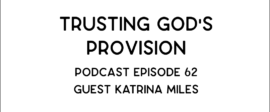Gleaning (Leviticus 19:9-10)
Bible Commentary / Produced by TOW Project
Although ancient methods of harvesting were not as efficient as today, yet Leviticus 19:9-10 instructs Israelites to make them even less so. First, they were to leave the margins of their grain fields unharvested. The width of this margin appears to be up to the owner to decide. Second, they were not to pick up whatever produce fell to the ground. This would apply when a harvester grasped a bundle of stalks and cut them with the sickle, as well as when grapes fell from a cluster just cut from the vine. Third, they were to harvest their vineyards just once, presumably taking only the ripe grapes so as to leave the later ripening ones for their poor and the immigrants living among them.[1] These two categories of people—the poor and resident foreigners—were unified by their lack of owning land and thus were dependent on their own manual labor for food. Laws benefiting the poor were common in the ancient Near East, but only the regulations of Israel extended this treatment to the resident foreigner. This was yet another way that God’s people were to be distinct from the surrounding nations. Other texts specify the widow and the orphan as members of this category. (Other biblical references to gleaning include Exod. 22:21-27; Deut. 24:19-21; Judg. 8:2; Ruth 2:17-23; Job 24:6; Isa. 17:5-6, 24:13; Jer. 6:9, 49:9; Obad. 1:5; Mic. 7:1.)
We might classify gleaning as an expression of compassion or justice, but according to Leviticus, allowing others to glean on our property is the fruit of holiness. We do it because God says, “I am the Lord your God” (Lev. 19:10). This highlights the distinction between charity and gleaning. In charity, people voluntarily give to others who are in need. This is a good and noble thing to do, but it is not what Leviticus is talking about. Gleaning is a process in which landowners have an obligation to provide poor and marginalized people access to the means of production (in Leviticus, the land) and to work it themselves. Unlike charity, it does not depend on the generosity of landowners. In this sense, it was much more like a tax than a charitable contribution. Also unlike charity, it was not given to the poor as a transfer payment. Through gleaning, the poor earned their living the same way as the landowners did, by working the fields with their own labors. It was simply a command that everyone had a right to access the means of provision created by God.
In contemporary societies, it may not be easy to discern how to apply the principles of gleaning. In many countries, land reform is certainly needed so that land is securely available to farmers, rather than being controlled by capricious government officials or landowners who obtained it corruptly. In more industrialized and knowledge-based economies, land is not the chief factor of production. Access to education, capital, product and job markets, transport systems, and non-discriminatory laws and regulations may be what poor people need to be productive. As Christians may not be more capable than anyone else of determining precisely what solutions will be most effective, solutions need to come from across society. Certainly Leviticus does not contain a system ready-made for today’s economies. But the gleaning system in Leviticus does place an obligation on the owners of productive assets to ensure that marginalized people have the opportunity to work for a living. No individual owner can provide opportunities for every unemployed or underemployed worker, of course, no more than any one farmer in ancient Israel could provide gleanings for the entire district. But owners are called to be the point people in providing opportunities for work. Perhaps Christians in general are also called to appreciate the service that business owners do in their role as job creators in their communities.
(For more on gleaning in the Bible, see "Exodus 22:21-27" in Exodus and Work above and "Ruth 2:17-23" in Ruth and Work at www.theologyofwork.org.)






